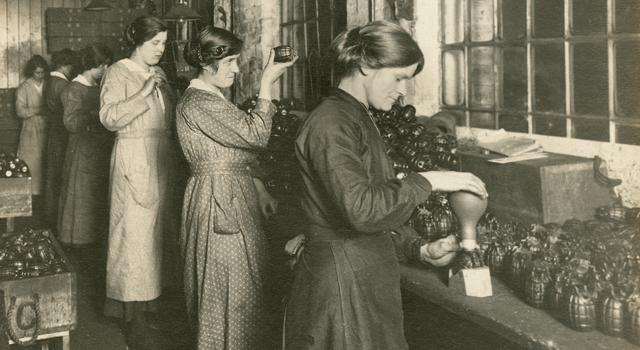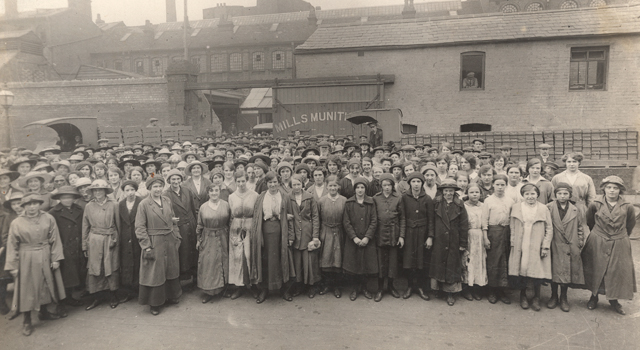Articles
No Comments
By Voices
On 06, Mar 2014 | No Comments | In Gender | By Voices
Mills Munitions Workers
Martin Killeen, Cadbury Research Library, University of Birmingham
www.suburbanbirmingham.org.uk
War work was changing employment for women, who ‘proved that their entry into the munition world has increased the output’. There were new opportunities particularly for teenage girls, as ‘in the case of a large Birmingham firm employing a considerable number of girls under 16; their labour was essential to the older women because their fingers were nimble and specially adapted for the light work required’.
![Mills Munitions Workers [Library of Birmingham: WK/B11/6700]](http://www.voicesofwarandpeace.org/wp-content/uploads/2014/02/wk-b11-6700.jpg) Production often continued round the clock and factory inspectors found that teenagers suffered less by night work than their elders:
Production often continued round the clock and factory inspectors found that teenagers suffered less by night work than their elders:
‘these young girls were always bright and alert at their work. The difference between them and their older hands between 5 and 6 a.m. was remarkable. Older girls suffered most from night work because they spent too much of their free time in shopping and recreation rather than rest’.
The photograph shows women manufacturing grenade base plugs at the Mills Munitions factory in Birmingham. Soon after the outbreak of war it had quickly become common for ‘an engineering shop to be staffed almost entirely by women ‘hands’, and it is no uncommon sight to find in the centre of the shop women tool-setters, and at another women guagers who test the product of this combined women’s labour’.
![Mills Grenade [Birmingham Museums Trust: 2000d112]](http://www.voicesofwarandpeace.org/wp-content/uploads/2014/02/2000-d00112-2.jpg) Although William Mills (1856-1932) is famous as the Birmingham inventor and engineer who developed the hand grenade familiarly known to First World War British soldiers as the ‘Mills Bomb’. Mills became the first engineer to successfully manufacture products using aluminium and in 1885 he established the first British aluminium foundry in Sunderland. Early in 1915 Mills converted the Atlas Aluminium Works at Grove Street and Bridge Street West, Birmingham into the Mills Munitions Factory. He was not given an exclusive production contract but the factory made about four million of the seventy-five million supplied to the British and Allied armies throughout the war.
Although William Mills (1856-1932) is famous as the Birmingham inventor and engineer who developed the hand grenade familiarly known to First World War British soldiers as the ‘Mills Bomb’. Mills became the first engineer to successfully manufacture products using aluminium and in 1885 he established the first British aluminium foundry in Sunderland. Early in 1915 Mills converted the Atlas Aluminium Works at Grove Street and Bridge Street West, Birmingham into the Mills Munitions Factory. He was not given an exclusive production contract but the factory made about four million of the seventy-five million supplied to the British and Allied armies throughout the war.
Daily life in a Birmingham munitions factory is vividly recounted in the memoirs of Peggy Hamilton, who was sent to the city for further training by the Woolwich Arsenal in preparation for joining the Government Rolling Mills in Southampton. Her hours were 7 to 7, six days a week, and ‘everyone was frightfully poor’ earning £1 per week; there were no travelling allowances, although Woolwich trainees had an additional 10/- to cover accommodation expenses away from home. Migrant munition workers found that reasonable accommodation was harder to find in Birmingham than elsewhere in the country; Hamilton ‘cycled round Birmingham in search of landladies for these girls, but they all said the same thing, that for 17s.6d a week they could not give the girls butter or milk. It was obvious that these girls would be seriously undernourished.’
![Mills Munitions Factory, Newtown [Library of Birmingham: WK/LV]](http://www.voicesofwarandpeace.org/wp-content/uploads/2014/02/wk-lv-m-mills-munition-workers.jpg) Hamilton also recalls being pelted with horse dung by girls from a rival firm and the practical jokes played on newcomers, while her lunch break fight with another woman in the cobblestone yard was cheered on by fellow workers, whilst the men crowded on to the fire escape to watch. Although she saw the Birmingham women as rough, they were ‘splendid types, full of humour, warm hearted, afraid of nobody, and with more pride and courage when in trouble than their sisters in the South.’ She most admired ‘their innate kindness, their generosity, loyalty, courage, and toughness in such an unfair world.’
Hamilton also recalls being pelted with horse dung by girls from a rival firm and the practical jokes played on newcomers, while her lunch break fight with another woman in the cobblestone yard was cheered on by fellow workers, whilst the men crowded on to the fire escape to watch. Although she saw the Birmingham women as rough, they were ‘splendid types, full of humour, warm hearted, afraid of nobody, and with more pride and courage when in trouble than their sisters in the South.’ She most admired ‘their innate kindness, their generosity, loyalty, courage, and toughness in such an unfair world.’
This is an extract from www.suburbanbirmingham.org.uk





Submit a Comment